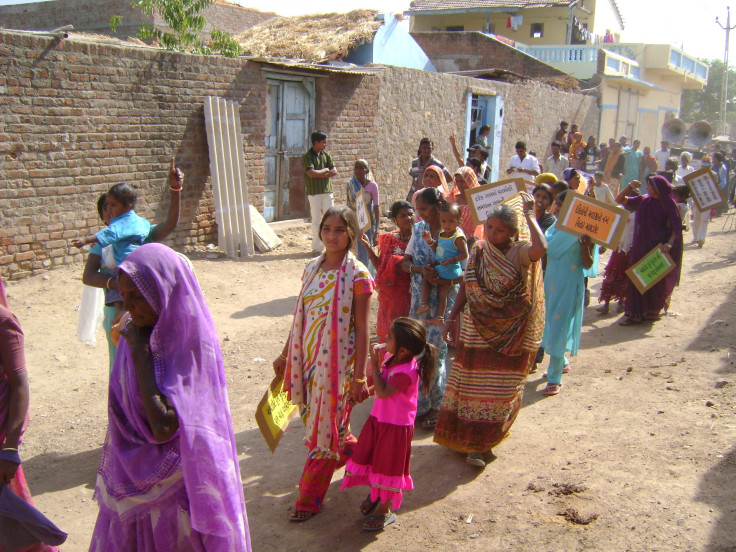Will Western Retail Supermarkets Lift India’s Dalits Out Of Poverty?

The controversial introduction of giant foreign retailers into the Indian market may provide benefits to one unlikely segment of the country’s vast population -- the Dalits, or Untouchables.
According to a report in the Daily Telegraph newspaper of Britain, the Dalits -- the most oppressed members of India’s ancient caste system -- are enthusiastic about the arrival of companies like Wal-Mart of the U.S. and Tesco of the UK, hoping they will provide jobs and lift millions of their people out of grinding poverty.
The ruling Congress Party of India has shrugged off massive opposition to the program, particularly from the nationalist Bharatiya Janata Party, or BJP, and small business lobbyists, who believe the entrance of foreign supermarkets will undercut and price out Indian shopkeepers.
A number of top government ministers have even resigned over the plan.
But the New Delhi government hopes that companies like Tesco and Wal-Mart will help modernize India’s aging food retail business by, among other things, eliminating middlemen in the process of moving crops from farmers to retail outlets. Reportedly, 40 percent of India’s food rots or goes to waste before they can be sold on the market because high-caste middlemen transport crops too slowly to market, thereby keeping prices excessively expensive.
Dalits also are hopeful that the introduction of Western retailing concepts will break down centuries of caste-related barriers.
“At the moment, the middlemen who control everything are [from] high castes, but, [after the entry of foreign retailers], there will be no role for middlemen and our firms will benefit," Milind Kamble, chairman of the Dalit Indian Chamber of Commerce, told the Telegraph. "India’s new shopping malls have created the maximum employment opportunities for ... the Dalits. But the government has [also] promised that the supermarkets will procure from small and medium enterprises and 20 percent of them will be Dalit enterprises.”
The Telegraph noted that while Dalits are still subject to extreme prejudice, deprivation and even violence in India, in recent years they have become something of a political force, with some lawmakers courting their support.
At least one Dalit businessman has even become a billionaire.
Rajesh Saraiya, born to a middle-class family in Dehradun in Uttarakhand in the north of India, now runs a multinational metals company based in Ukraine.
“People have to change from inside. They have to change their ideology, their mentality, and look around the world for what is happening. There are so many opportunities," Saraiya told Indian media last year.
However, life for the overwhelming majority of India’s 166 million Dalits remains extremely grim.
The Dalits -- the word "dalit" means “oppressed” or “downtrodden" in Sanskrit -- are stuck at the very bottom of the caste hierarchy and are forced to do the dirtiest jobs imaginable. They are forbidden from most professions and intermarriage with higher castes and subject to violence at the slightest provocation.
They also suffer discrimination in education and health care -- most Dalits live in extreme poverty, earning less than $1 per day.
According to the Dalit Foundation, 80 percent of India’s Untouchables live in rural villages, where they are frequently banned from using public water sources and many other public facilities.
“[Dalits] continue to be subject to discrimination, exploitation and violence simply because of their caste," Human Rights Watch commented. "In India’s hidden apartheid, untouchability relegates Dalits throughout India to a lifetime of segregation and abuse. Caste-based divisions continue to dominate in housing, marriage, employment and general social interaction -- divisions that are reinforced through economic boycotts and physical violence.”
Navsarjan, a Gujarat-based Dalit organization that seeks to end caste discrimination, estimates that 62 percent of Dalits are illiterate, while the average Dalit household has an annual income about two-thirds India’s national average.
“Less than 10 percent of Dalit households can afford safe drinking water, electricity and toilets, which is indicative of their deplorable social condition,” the group noted.
The Christian Examiner, a U.S.-based newspaper, compared the plight of the Dalits in India to blacks in the old segregated U.S. South.
“Indian cultural norms divide the Dalit from the high castes,” the Examiner wrote. “In [many villages], the [Dalits] are confined to one section and must not mingle with the high caste for fear of contaminating them.”
"One of our [Dalit] church members is essentially being treated as a slave by some of the high-caste members of his village," a Christian pastor’s wife named Priya Kumnle told the paper. "They make him do odd jobs for them, but they don't allow him into their homes."
Dalits who have converted to other religions have not escaped the harsh rules of caste distinctions.
“In India, Islam, Sikhism and Christianity (among other religions) maintain some form of caste despite the fact that this contradicts their religious precepts,” said a report from Navsarjan.
“As a result, dominant castes maintain leadership positions, while Dalit members of these religions are often marginalized and flagrantly discriminated against. For example, Dalit Christians are provided separate burial areas from non-Dalit Christians.”
It remains to be seen whether the introduction of Western retail supermarkets will suddenly improve the fortunes of India’s millions of impoverished Dalits. One of the major obstacles to such liberation would be the intransigence of upper-caste Hindus who will refuse to do business with a Dalit or even deal with one an equal basis.
“More than 60 years after gaining independence, India is still very much afflicted by the cancer of the caste system," Navsarjan warned. "Dalits remain the most vulnerable, marginalized and brutalized community in the country.”
© Copyright IBTimes 2024. All rights reserved.





















